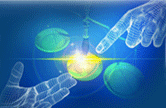 |
| ||||||||||||||||||||
|
| |||||||||||||||||||||
Movement-Assisted Connectivity Restoration
|
Abstract Recent years have witnessed a growing interest in applications of wireless sensor and actor networks (WSANs). In these applications, a set of mobile actor nodes are deployed in addition to sensors in order to collect sensors' data and perform specific tasks in response to detected events/objects. In most scenarios, actors have to respond collectively, which requires interactor coordination. Therefore, maintaining a connected interactor network is critical to the effectiveness of WSANs. However, WSANs often operate unattended in harsh environments where actors can easily fail or get damaged. An actor failure may lead to partitioning the interactor network and thus hinder the fulfillment of the application requirements DARA, a Distributed Actor Recovery Algorithm, which opts to efficiently restore the connectivity of an interactor network to its pre-node-failure level. Based on the type of connectivity considered, two algorithms, namely, DARA-1C and DARA- 2C, are developed to address 1 and 2-connectivity requirements, respectively. DARA is a localized scheme that avoids the involvement of every single actor in the network. DARA pursues a coordinated multiactor relocation in order to reestablish communication links among impacted actors. The main idea of DARA-1C is to replace the dead actor by a suitable neighbor. The selection of the best candidate (BC) neighbor is based on the node degree and the physical proximity to the dead actor. The relocation procedure is recursively applied to handle any actors that get disconnected due to the movement of one of their neighbors (e.g., the BC that replaced the faulty actor). Similarly, DARA-2C identifies the nodes that are affected, i.e., lost their 2-connectivity property, due to the failed actor. Some of these nodes are then relocated in order to restore 2-connectivity. Although both DARA-1C and DARA-2C pursue node relocation to restore the desired level of connectivity; they fundamentally differ in the scope of the failure analysis and the recovery Proposed System: In this paper, we present DARA, a Distributed Actor Recovery Algorithm, which opts to efficiently restore the connectivity of the interactor network that has been affected by the failure of an actor. Two variants of the algorithm are developed to address 1- and 2-connectivity requirements. The idea is to identify the least set of actors that should be repositioned in order to reestablish a particular level of connectivity. DARA strives to localize the scope of the recovery process and minimize the movement overhead imposed on the involved actors. Hardware Requirements :
Software Requirements :
<< back |
Related Projects : File Security System ,M-banking ,Flaw Tracking System ,Fleet Manager ,Friend Mapper on Mobiles ,Global Tracker ,Good Welfare Services ,Health Maintenance System ,Image Compression and De-compression ,Image Processing Editor ,Improving Utilization Of Infrastructure Clouds , Information Content-Based Sensor Selection ,Information Portal ,Insurance Broker System ,Learning Made Easy , Light-Weight Multi-Document Summarization Based On Two-Pass Re Ranking ,Load Shedding In Mobile Systems With Mobiqual ,M-banking ,MACA ,Mailing Portal ,Mail Client ,Marine Operations And Management System ,Medical Image Compression ,Millennium Planning ,Mindtech Bug And Component Systems ,Minimum Bandwidth Reservations For Periodic Streams In Wireless Real Time Systems ,Mitigation of Control Channel Jamming ,Mobi-Thesaurus ,Mobile Advertisement System ,Mobile Banking System
| Copyright © V2computers 2006 through 2017 |